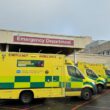
There have been seven further Covid-related deaths reported by the Department of Health today (Monday).
All seven of these occurred in the last 24 hours – according to the official dashboard – which has the overall total now at 1,203.
There have been three further deaths in the Armagh, Banbridge and Craigavon borough since Friday, where the total number of lives lost is now 120. The death toll in the Newry, Mourne and Down district is now at 81 – up two since Friday. A total of 99 – up two – people have died in the Mid Ulster region.
There were a further 555 cases reported in that timeframe, with 90 in Armagh, Banbridge and Craigavon (second highest in NI) and a further 38 in Newry, Mourne and Down. There were 49 cases in Mid Ulster.
A total of 3,427 individuals were tested.
There are 446 – up 21 from Friday – people now in hospital as a result of the virus, 30 – down one – of whom are in intensive care units.
There are currently 23 – up three – ICU beds available in Northern Ireland.
Sixty-six patients are in Craigavon. To date, 672 patients have been discharged from the Co. Armagh hospital.
There are 19 Covid patients in Daisy Hill, with six in Lurgan Hospital, while there is one in south Tyrone hospital.
Meanwhile, Minister of Education Peter Weir has defended his decision to allow schools to return to face-to-face teaching in the first week of January.
In a statement to the Ad Hoc Committee, Mr Weir, cited the impact of loss of learning, social isolation, and the detrimental impact on their mental health, the consequences of which “may be felt in their lives for years to come”.
“That is why myself, my Department and indeed the whole Executive has sought to prioritise the future of our young people, and in particular their education, in consideration of any measures or restrictions that were being considered,” he said.
“That is why the Executive agreed to a full return to school with mitigations, as soon as it was safe to do so, and why the Executive has supported a range of measures to support people both academically and in terms of mental health and wellbeing. That is why
any decision around the education of our young people has not simply been taken in the context of the impact of Covid, but balanced against a range of wider considerations.”


